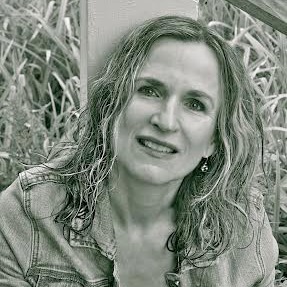Alumnae Poets
Rebecca Foust '79
Select Poems
Caught in a gust stilled by the camera lens, the flag is not quite flagging −
more like shying away. The lower right corner lofts up, trying
to refold itself like the coffin flag kept in a tight triangle
in Grandma’s attic, brought down to hang on her house four times
a year, sunrise to sunset, taken down at the least threat of rain.
This house is like her house, and also maybe, our country: good bones,
clean lines, a strong foundation, and in need of work. The cellar
is deep and cool, with rows of canned peaches, beets, and beans
caught in light slanting down through the coal chute. Yes, there are
too many bodies buried down there, and the coal was a disaster,
but look − those jars glow like jewels casting their colors on the dirt walls,
and the upstairs rooms could − if we unlocked them − hold multitudes.
The porch could be set, like this, to welcome travelers again:
a rocker, lace curtains, a low stoop where Papap sat to watch hawks
swinging parabolas over the meadow. That other Athens
was the birthplace of democracy until it fell, and now, signs of our fall
are all around: rumors of war, children wailing behind barbed wire,
and after the wildfires, the sky gone down on one knee
in broad streaks of blood and ash. I still have hope, but it’s flagging,
and I keep shying away from belief in anything but sorrow
in tomorrow’s news. For three years I’ve been afraid and unable to write
about America. I am afraid now even to talk about America.
Papap fought, Dad fought, many cousins fought, and those who survived
would say it was worth it. I miss the parades, miss being a child
with a nickel flag in my hand, or just looking up and seeing a flag like this
− any American flag − and feeling only proud.
(from The Map of Every Lilac Leaf: Poets Respond to the Smith College Museum of Art, 2020)

